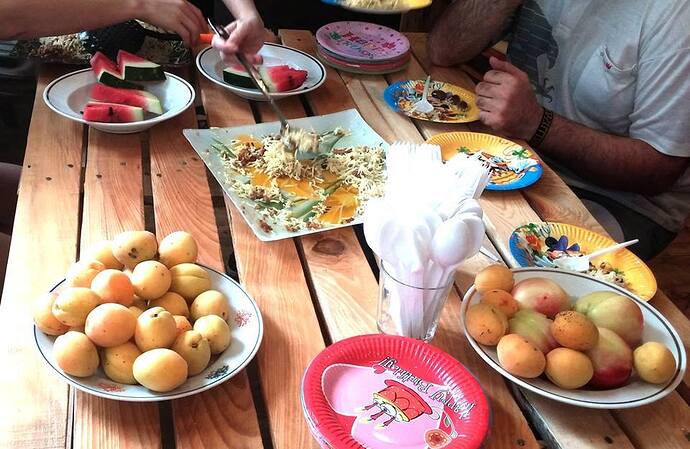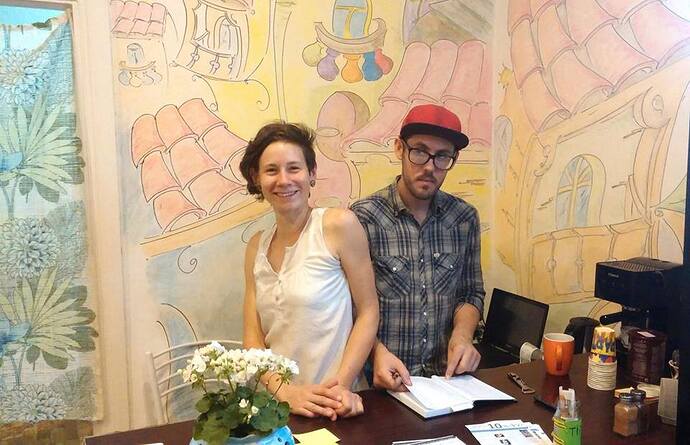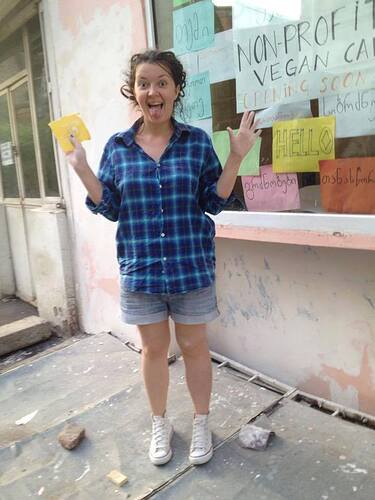"To inspire people, that is my kind of activism."
Located in the oldest part of Tbilisi, where you can easily loose your way in the maze of small streets, a new initiative saw the day of light one month ago. Curious neighbors and wandering tourists have experienced the hospitality that vegan community cafe Kiwi offers.
Although I am neither vegan nor vegetarian, the approach Kiwi Cafe uses is inspiring. Through education, rather than scaring, they want to convince people of a vegan life style. I even have given up cow milk products myself (for now).
The cafe was set up by a group of individuals that met each other in Tbilisi, foreigners and Georgians. The set up of the cafe was funded out of their own pockets, plus they got all their furniture for free from their community members. Plus free labor. Right now the cafe is self sustaining, but they are not able to pay actual salaries yet, something which they hope to be able to do eventually.
Alberto visited Tbilisi, and together with Khatuna from UNDP, Eric from Jumpstart and Jonne from Elva we had lunch at Kiwi.
A few days later I sat down with Helen, on of its founders, to talk about the story behind Kiwi.
So we are a group of people, in the beginning mainly three people, who decided to start Kiwi Cafe. This was the beginning of June. We found this place and decided to rent it so we could get started right away. We worked on renovations for a month approximately, and planning, and then we opened. And now the constellations changed a bit. The people who were there from the start, except for me, are not working here a lot. There are now four of us who are working here every day, full time. We are volunteers, so far, but we hope that, even though we are not for profit, we will be able to give ourselves a small salary to be able to sustain.
The reason we started is because I have friends, and other people, who have been asking me a lot of questions about vegan lifestyle. What do you eat, is it possible to be vegan in Georgia, what can you eat, what do you do when you don’t eat meat, and so on. My idea is that people don’t know what veganism is, and the advantages of being vegan. So, they have a lot of questions about this.
I think that most vegans try to convert people, convince people to become vegan, and I think inspiration is the best way to convert people. To establish this idea and make people understand why it is nice and why it is good. Rather than actually radical protests and making the documentaries which show the horrible meat industry. Which is of course important, but people just don’t want to see that. They want to see the positive side of something. That is my form of activism.
And that is also why we organize various events. Yesterday, for example, we had a concert, folk musicians, a band from Russia. And we have film showings some evenings, and origami master classes. We want to have has many different types of events as possible: for people who want to teach others what they know, in something they are very skilled at; people who want to learn something together, like a study circle kind of practice; show interesting films that people have not seen, that haven’t reached Georgia, both documentaries and fiction.
Helen explains me that they don't have a manager. They are volunteers and believ that you can't have someone telling you: “you must do this.” Helen has experience in working with organizations without a leader, where you make decisions together. And, athough she says it's kind of difficult, she does believe it is possible.
Our team, Victoria from Russia, Moscow, Mariam, she’s from here, and Sergei, he’s from Krasnodar. We don’t have any actual roles. But Sergei, he has professional experience as a chef, so he’s always in the kitchen. I am sometimes in the kitchen and sometimes out here. And Victoria and Mariam are mostly out here. But we do circle around.
The problems we have right now is that we are all working a lot, all of us, all the time, which makes it impossible to do outside stuff, like promotion, social media stuff. And also to improve like, decorations, and develop the menu. Stuff like this. We would need somebody just responsible for this. But hopefully. We’re trying to recruit some more volunteers.
When you start, you are small and you have all things in hand, that needs to be done. It feels difficult to recruit somebody new. We would have to teach them everything. Of course it is possible.
We have not reached one month yet, but every day we get here, usually sergei and I, at 9 o’clock, and we prepare food. If we’ve already prepared most we can come a bit later. Clean up a little bit. And then we open at 12. People come usually for lunch between 12 and 2, after that it’s a bit quiet for a while. And sometimes in the evening we have a ton of people.
Most mornings we have two people working, one in the kitchen and one out here, others can come a bit later.
We also have friends in our community that help out doing dishes, and also help out with practical things like, now we are trying to install this internet thing. It’s been very frustrating. It has been a big problem getting internet to work here. But we have a lot of support from our friends, they help out.
So far they have mostly foreigners as customers. But sometimes they have locals. Sometimes their neighbors come in.
I have perceived mostly positive reactions. We’ve only had a few times some drunken man came in and told us our beer was to expensive. But then we tell them it is a cafe and that they can get cheap beer across the street at the corner shop. Once we had two guys coming in saying: “What are you doing here? This is our city!” But, whatever.
A lot of people have been very curious. Before we opened we had all these signs on the windows and people thought it was very unusual and strange, and a lot of people came in because the door was always open.
Besides money, the support that Kiwi could use is more volunteers. Yes, they have people helping out washing dishes, but they would actually need people who can commit to one day a week, Helen tells me. She also mentions that they are trying to find some organically grown vegetable provider, because right now they don't know where to get it.
I tell her about Iva, who has greenhouses where he grows organic vegetables. I tell her I live close and if she can get a good deal with him, I can take the vegetables to the cafe on a regular bases. A few days later she tells me that they don't have any produce right now, but that they will touch base again in September.
Another problem we’ve encountered in the process, is that we wanted to start a non profit organization, but we ave not done that, this place is not registered as non-profit. Because we realized in the process of registering that it would be very difficult. That we would have to hire an accountant, and a tax lawyer, and so on, for us to be able to show that we are actually not making any profit ourselves. Instead we registered as a small individual entrepreneur, and this might be misleading to some people, we tell them we act like a non profit, but we registered so we don’t have to spent money on the accounting as we otherwise should. We also would have to pay higher taxes as non profit. Even if you are very small, you would still have to pay more taxes as you would when you are a small individual entrepreneur. Georgia makes it very easy to start a business, but it makes it very difficult to start a non-profit organization. Especially one which seems on the surface as a business type entity. And this is a business type entity that would provide money for our costs, but it’s still non profit. But it seems suspicious probably.
And what can they offer themselves?
The concept of having a community cafe where we host events, the experience we build up in such a short time, I guess that is what I can share with a larger community. Our cafe is open to everyone, if you can not afford to buy anything you can still come in and sit down and join our events for free. And I think this could be something that could be inspirational.
What about similar initiatives?
In Georgia I don’t think there are any similar initiatives. There are places that host events, like Zoestan on Leselidze street. But internationally, for sure. Many places I have been to in the states, in Berlin, also in Malmo in Sweden where I lived for a long time we had a cafe that was kind of similar, they had movement events, though that was mostly political.
Pooling resources: sounds like a good idea, I think that’s what we’ve done here.
Collaboration: most important thing for human beings in general, I though a lot of this. In some cultures people compete a lot, and in some people collaborate more. At least on the surface, maybe there’s competition under the surface. In the american culture, I lived for some while over there, there is quite a lot of competition, and in Swedish culture, where I also live a long time, it is more collaboration. And I enjoy the second one much more. Even though, both can be successful.




